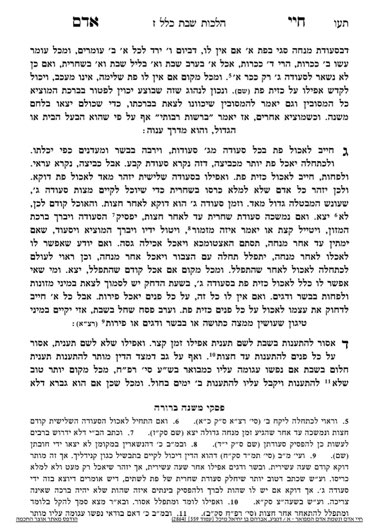The current series, which will cover seudos Shabbos and fasting on Shabbos, is available for sponsorship. Please contact Rabbi Reingold for more information
We are beginning siman 4. The Chayei Adam writes that a person is not allowed to fast on Shabbos. This applies in two ways, both to fasting for the entire day and even a part of the day, or refraining from eating even for just a small part of Shabbos for the purpose of fasting. Since Chazal wanted a person to eat on Shabbos, they imposed an issur against fasting after chatzos. If a person is davening at a minyan which will finish after chatzos, he must drink something before davening in order to avoid this issue. Alternatively, the Shul could have a break in the middle of davening.
The Shulchan Aruch brings this halacha at the beginning of siman 288. The Biur Halacha brings a machlokes whether this question is deoraysa or derabanan. Those who hold it is deoraysa hold that the pasuk of ichluhu hayon is the mitzvah to eat the man on Shabbos, and included in the positive mitzvah is a negative mitzvah against refraining from eating it. Thus, if one learns that eating the seudos on Shabbos is a mitzvah deoraysa, fasting is an issur deoraysa. This is the opinion of the Rashba, among others.
Others understand that the source for the issur to fast is derabanan (or divrei kabbalah, which are like issurei derabanan). The pasuk in Yeshayahu says verkarasah laShabbos oneg, which teaches that Shabbos should be a day of enjoyment and not fasting. If so, as an issur derabanan to fast. We have learned that even if it is an issur derabanan, it was instituted by Moshe Rabbeinu.
The Elya Rabbah brings an opinion that if the pasuk tells us Shabbos should be a day of enjoyment, if one enjoys being involved in Torah and tefillah, they may continue to do so even if they will not eat until after chatzos. However, the Mishnah Berurah does not bring this opinion, which is an indication he does not agree with it even in a pressing situation.
There is one exception where a person is allowed to fast on Shabbos, and that is a chalom rah, a bad dream. The Gemara says that if a person has a bad dream, if it is something they were thinking about during the day, or they have a dream deficit and dream about something a few days later, the dream is of no significance.
If a person did not think about the topic during the day, we are concerned that the dream is a siman from shamayim and a person should do something. The Gemara says the best option is to fast. Although generally, one who plans to fast declares so in shemoneh esrei the mincha before, over here, one does not need to do so, because fasting is a tikkun for anything bad happening, so it is as if shamayim told him to fast, and made the kabbalah taanis for him.
Summary
-One should not fast on Shabbos, except for a taanis chalom.
-The issur of fasting includes;
- Fasting the whole day;
- Fasting until after chatzos, even unintentionally;
- Refraining from eating even for a short period of time, if there is intent to be counted towards fasting.
– Fasting the whole day may be an issur deoraysa.



